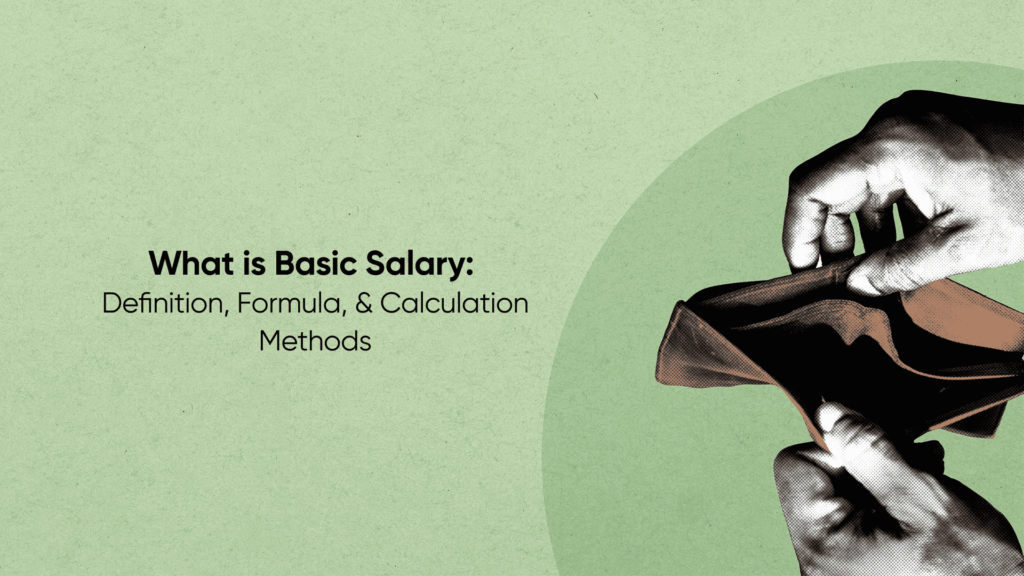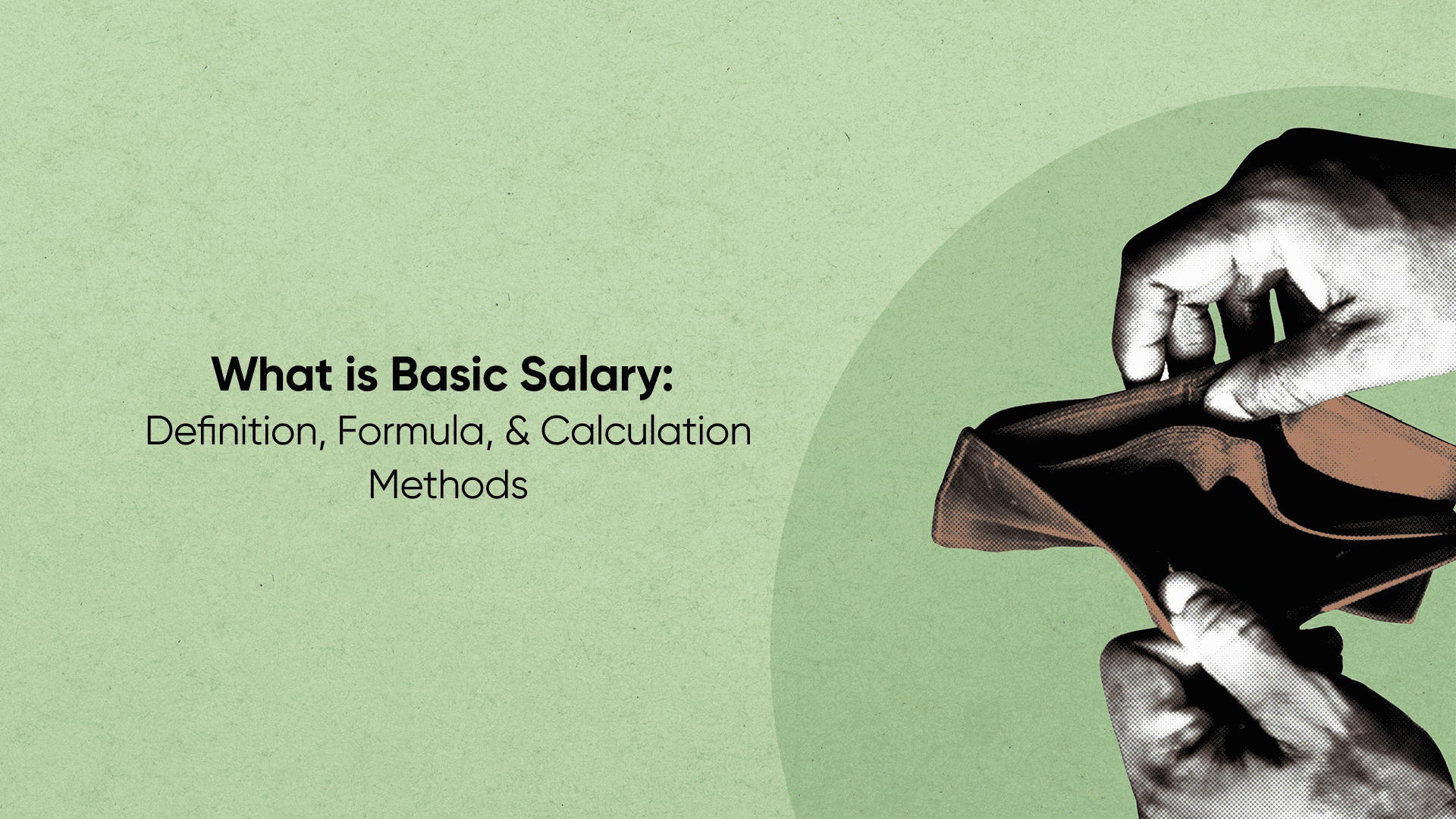What is Basic Salary: Definition, Formula, & Calculation Methods

Table of Contents
ToggleWhat is Basic Salary?
Basic salary is the fixed amount or base salary paid to an employee. The total salary comprises various components like basic salary, allowances, provident fund (PF), tax (TDS), and more. If you are a fresh graduate or a working professional, you must know how to calculate your basic salary. Understanding your pay structure will help you negotiate better and plan your finances more effectively.
This blog explains the different salary components, formulas and calculations along with examples to simplify and make it easier to understand the salary structure.
What are the Different Components of Basic Salary
The different components of Basic Salary include:
Basic Salary: 50% of CTC or 40% of Gross Pay. This is the fixed part of the component.
Dearness Allowance (DA): Allowance to cover cost of living, usually for government employees
House Rent Allowance (HRA): Allowance to cover rental accommodation
Special Allowances: Allowances for entertainment, internet, mobile recharge, etc.
Medical Allowance: To cover medical allowance
Leave Travel Allowance (LTA): Allowance to cover domestic travel costs for employees and their family
Bonus/Variable Pay: Incentive paid over and above basic salary, sometimes linked to performance at work
Professional Tax: Tax levied by state governments and deducted from total salary
Provident Fund (PF): Contribution made by employee and employer to employee’s provident fund account
Also Read: Salary Slip: Understanding the Components and Details of a Payslip
How to Calculate Basic Salary?
Basic salary is calculated from gross salary by deducting all the allowances, benefits, and bonuses. Any compensation received for working overtime is not included in the base salary. Basic salary can also be calculated from CTC and is used to calculate other components of salary structure. Base pay remains the same unless negotiated with the employer.
Formula for Calculating Basic Salary
Basic salary can be calculated from gross salary or CTC. The formula for calculating basic salary is as follows:
Gross | CTC | |
Basic Salary Calculation | Basic Salary = Gross Salary – Allowances (DA, HRA, Medical Insurance, conveyance allowance, bonus etc) | Basic Salary = 50% of CTC or 40% gross pay |
Examples of Basic Salary Calculation
Basic salary can be calculated in two ways:
Basic Salary From Gross Salary: Consider the pay structure of employee A with a gross salary of ₹40,000.
Basic Salary (Gross Salary given) | 1. Gross Salary: ₹40,000 2. HRA (House Rent Allowance): Assume 20% of the basic salary (₹40,000): – HRA = 20% of ₹40,000 = ₹8,000 3. DA (Dearness Allowance): Typically, DA can be around 10% of the basic salary. Thus: – DA = 10% of ₹40,000 = ₹4,000 4. Medical Insurance: ₹1,000 (fixed amount) 5. Conveyance Allowance: ₹1,000 (fixed amount) 6. Other Allowances: ₹2,000 (assumed) Now, to find the Basic Pay, we need to calculate it as: [Basic Pay] = {(Gross Salary) – [(HRA) +(DA) + (Medical Insurance) + (Conveyance Allowance) + (Other Allowances)]} Basic Pay= ₹40,000 – (₹8,000 + ₹4,000 + ₹1,000 + ₹1,000 + ₹2,000) Basic Pay= ₹40,000 – ₹16,000 Basic Pay = ₹24,000 So, in this example: – Gross Salary: ₹40,000 – HRA: ₹8,000 – DA: ₹4,000 – Medical Insurance: ₹1,000 – Conveyance Allowance: ₹1,000 – Other Allowances: ₹2,000 – Basic Pay: ₹24,000 |
Basic Salary calculated from CTC: Let us consider employee B who has a CTC of ₹10,00,000
Basic Salary (CTC is given) | Basic Salary = 50% of CTC CTC: ₹10,00,000 To find the Basic Pay, we need to calculate it as: Basic Pay = 50% (10,00,000) Thus, the Basic Pay will be ₹5,00,000 per annum or ~₹41,660 per month Basic Pay = ₹5,00,000/ annum or ~₹41,660/ month |
Importance of Basic Salary in Salary Structure
Basic salary is important to calculate other components in salary structure. Understanding basic salary helps as below:
Salary Negotiation: Having a clear understanding of basic salary and a breakdown of salary structure helps one to negotiate effectively before one joins a new company or at the time of appraisal.
Maintain Transparency: Basic salary helps maintain uniformity and structure across an organisation. leads to better retention and trust among employees.
Employee Rights: Basic salary is defined under legal laws and regulations. This ensures the employee is compensated fairly and the base salary is not unfairly reduced or exploited by an employer. It enforces employers to pay the minimum basic salary required to pay the employees.
Loan Eligibility: Banks often consider base salary to evaluate the personal loan eligibility and decide on the loan amount by understanding the minimum salary for personal loan approval. Even a credit card limit and its benefits are determined by base salary.
Differences Between Basic Salary and Gross Salary
Basic Salary | Gross Salary | |
Definition | Basic salary is the base amount paid to an employee devoid of allowances, benefits or deductions. | Gross salary is the monthly or annual salary received by an employee without any tax deductions. |
Formula | Basic Salary = Gross Pay – Total Allowances (DA, HRA, Medical Insurance, conveyance allowance, bonus etc) | Gross Salary = Basic Salary+ HRA + Other allowances |
Components | Basic salary component is gross salary devoid of any allowances. Basic salary is 50% of CTC or 40% of gross pay. | Gross salary components include basic salary, HRA (housing rent allowance), PF, pre-requisites, special arrears, special allowance, bonus, and professional tax. |
Importance | Basic salary is required for PF calculation and gratuity | Gross salary is required to calculate tax liability |
Fluctuation | Less fluctuation, it is usually fixed | More fluctuations, changes as per allowances, bonuses etc |
Factors that Affect the Basic Salary
The basic salary can be affected by several factors like
Company policies: Different companies have different salary structures based on their company policies.
HR policies: Guidelines and policies of the HR department are subject to change and also impact basic salary decisions.
Location: The cost of living in a city/country is an important consideration. Basic pay tends to be higher in lucrative urban areas. But the cost of living is also higher in urban areas.
Designation: Basic pay increases with increased roles, responsibilities and seniority levels in the organisation.
Industry/Sector: Salary standards vary across industries like IT, banking, real estate, etc., based on market demands.
Experience: More experienced candidates can negotiate for better salaries than freshers.
What are the Additions to Basic Salary?
Additions are components added to the basic salary. Basic salary and additional components are used to calculate gross salary. These additions includes:
Overtime pay: Overtime pay is compensation received for any extra hours of work done.
Bonuses: Bonus is usually given as part of a raise or incentive to an employee, apart from their base salary.
Employee Stock Option (ESOP): This is an employee benefit plan that gives ownership interest in the company in the form of shares.
Gratuity Allowances: Some common allowances as mentioned.
Dearness Allowance (DA): Allowance to cover the cost of living.
House Rent Allowance (HRA): Allowance to cover rental accommodation.
Special Allowances: Allowances for entertainment, internet, mobile recharge, etc.
Medical Allowance: To cover and manage the unexpected medical expenses.
Leave Travel Allowance (LTA): Allowance to cover domestic travel costs for employees and their family.
Incentives: It is a pre-decided amount given to an employee if they can achieve a set goal.
Commissions: These are based on performance and set percentage of sales. These could be in the form of bonus, travel vouchers (usually in Sales).
Severance: Pay given to an employee who has been laid off, retired or decided to terminate employment.
What are the Deductions to Basic Salary?
Deductions are expenses that are subtracted from an employee’s gross income to reduce the amount that is subject to taxation. Deductions include
Provident Fund (PF): A small part of salary is contributed by both the employee and employer each month for savings and retirement.
Income Tax: This tax varies as per the tax slab an employee falls into and is deducted by the central government
Professional Tax: This tax is deducted by the state government in a given financial year, as per the employee tax slab
ESI: Social insurance program that provides medical insurance to employees and their dependents. Employees are exempted from paying any tax on this, however, the employer has to contribute a certain amount monthly for this program.
Labor Welfare Fund: It is a statutory contributory fund managed by the individual state government authorities in India.
Also Read: EPF Loan: Required Documents & Application Process
Conclusion
Having a clear understanding of basic salary will empower one to negotiate for a better salary. Salary breakdown helps you to know your benefits and tax implications. Since it is defined by laws and regulations, it ensures fair compensation and uniformity across an organisation. Also, a higher base salary makes one eligible for higher loan approval. One can have a better approach to plan their finances well and make an investment plan on that basis.
Frequently Asked Questions
Some allowances are taxable and some are not taxable.
Yes, leave encashment is taxable but varies as per sectors and employers
Yes, basic salary is fully taxable in India.
Basic salary is the fixed amount of money an employee receives before any deductions or additions are made.
The CTC is calculated as CTC= basic salary + benefits + PF
To calculate basic salary, you need to know deduct allowances and any other deductions from gross salary and use this formula: Basic Salary[A1] = Gross Salary[B1] – (HRA[C1] + DA[D1] + Other Allowances [E1]+ Deductions[F1]). Label and input values in their columns. Put formula ‘= B1 -(C1+D1+E1+F1)’ in Basic Salary column and get the final value.
As per the New Wage Code, the basic salary needs to be at least 50% of the net CTC.
The format of basic salary is, Basic Salary = Gross Salary – (all allowances + benefits + bonuses)













